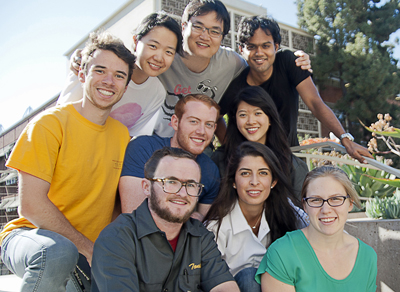Education at PSTI
 A unique strength of the plasma education
available at UCLA is its breadth. All the major areas of contemporary interest related to plasma science and technology are
represented in the programs of the faculty and research staff.
A unique strength of the plasma education
available at UCLA is its breadth. All the major areas of contemporary interest related to plasma science and technology are
represented in the programs of the faculty and research staff.
Graduate students in the UCLA plasma programs are exposed to a wide range of research opportunities available in several departments and have access to world-class laboratories and computational facilities. In recent years graduates from the UCLA plasma programs have received numerous job offers in industry, national laboratories, and academia. Some have chosen to remain as professional researchers at UCLA.
Prospective graduate students should consult the individual web pages of the departments of interest to acquaint themselves with the entry requirements to UCLA. Each department handles admission to graduate status. However, students who are interested in pursuing a plasma-related dissertation are encouraged to contact PSTI early in the process to obtain an individual update of current research opportunities. It is often the case that some research groups can take on a student in the summer prior to the start of the first year. Students who take advantage of this opportunity often complete their degrees sooner. Also, the institute awards supplementary fellowships to outstanding candidates who are interested in plasma research. Individual departments and/or members of PSTI make nominations for these awards.
Although the graduate programs vary across the departments, the overall pattern consists of a first year concentration on core courses in the subject matter represented by the department. The second year is devoted to introductory courses related to plasmas and can involve instructors from various departments. Beyond the third year the students pursue individual research leading to their dissertation and attend advanced seminar courses. It is possible for students enrolled in a given department to have a thesis advisor from another department. The dissertation committees that approve the award of a PhD are composed of at least three individuals from the home department and one from an outside department. The academic programs in the disciplines related to plasma science and technology at UCLA encompass 7 undergraduate and 28 graduate courses spread over 5 departments and involving 20 faculty members. It is common for graduate students to take plasma-related courses in several departments.
The courses presently available to students in the plasma disciplines at UCLA are listed below. One hundred numbers correspond to undergraduate courses and two hundred numbers to graduate courses. For a detailed description of each course the UCLA "General Catalog" should be consulted.
Physics and Astronomy
- 122--Introduction to Plasma Physics (same as EE 185)
- 150--Physics of Charged-Particle and Laser Beams
- 160--Numerical Analysis Techniques and Particle Simulations
- 180E--Plasma Physics Laboratory
- 222A,B,C--Plasma Physics (the core graduate sequence)
- 250--Introduction to Acceleration of Charged Particles
- 260--Problems in Plasma Physics
- 269C--Accelerator Physics
- 280E--Advanced Plasma Laboratory
- 290--Research Tutorial in Plasma Physics
- 294--Research Tutorial in Accelerator Physics
Electrical Engineering
- 185--Plasma Electronics (same as Physics 122)
- 285A,B--Plasma Waves and Instabilities
- 287--Fusion Plasma Physics and Analysis (same as MAE 237B)
Mechanical and Aerospace Engineering
- 137--Introduction to Fusion Engineering and Reactor Design
- 237B--Fusion Plasma Physics and Analysis (same as EE 287)
- 237--Fusion Reactor Technology and Design
- 239H--Special Topics in Fusion Physics, Engineering and Technology
Earth, Planetary, and Space Sciences
- 154--Solar Terrestrial Physics
- 200C--Plasmas, Aeronomy and the Interplanetary Medium
- 240--Space Plasma Physics
- 261--Topics in Magnetospheric Plasma Physics
- 288A,B,C--Seminars in Space Physics
Atmospheric and Oceanic Sciences
- 154--Introduction to Solar System Plasmas
- 205A--Introduction to Solar System Plasmas
- 205B--Descriptive Solar-Terrestrial Physics
- 250A--Solar System Magnetohydrodynamics
- 250B Solar System Microscopic Processes
- 256--Ionospheric Electrodynamics
- 257--Radiation Belt Plasma Physics
- 296G--Upper Atmosphere and Space Physics
